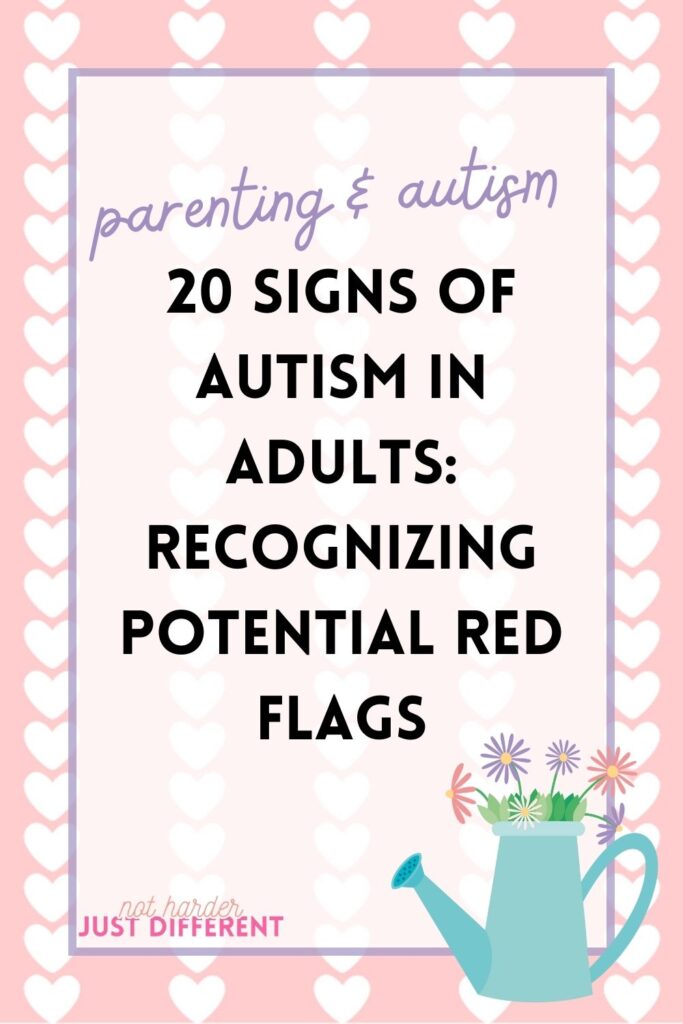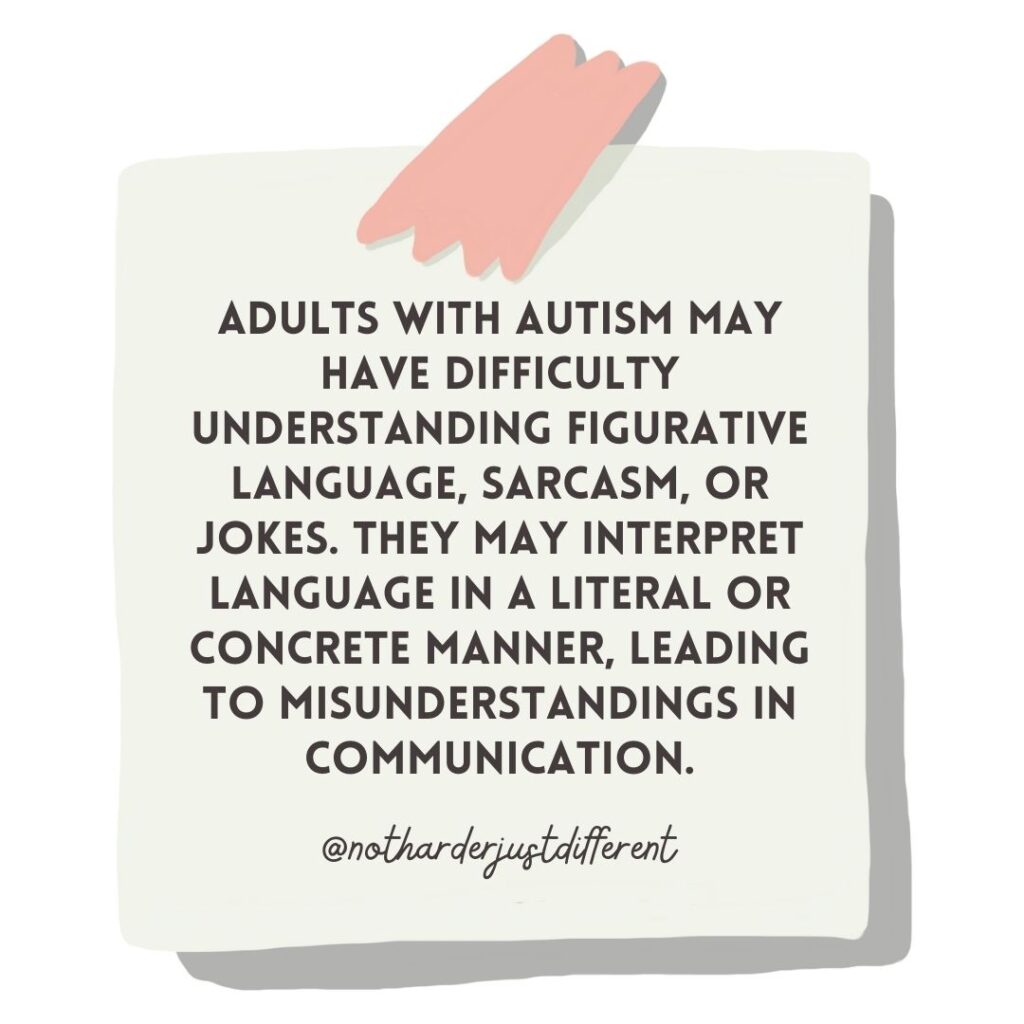Disclaimer: As a future Licensed Clinical Social Worker (LCSW) currently pursuing my master’s degree, I am passionate about sharing insights and information related to parenting, autism and homeschooling based on my personal experiences and research. However, the content shared on this blog is not intended to substitute professional advice, diagnosis, or treatment. Parenting is a deeply personal journey, and while I strive to provide valuable insights, every family and situation is unique. Readers are encouraged to consult with qualified professionals for personalized guidance tailored to their specific needs and circumstances.
Wondering if some of the quirks you or someone you know are experiencing might be signs of autism in adulthood? You’re not alone. Autism can manifest differently in adults compared to children, but knowing the signs of autism in adults can help you seek appropriate support and understanding. Let’s dive into 10 common characteristics to watch out for in adults.
Table of Contents
Quick Disclaimer: Remember, exhibiting some of these signs doesn’t necessarily mean you or someone you know has autism. However, recognizing these characteristics can be a first step in understanding and seeking support if needed. If you have concerns about yourself or someone else, consider consulting with a healthcare professional for further evaluation and guidance.

1. Difficulty with Social Communication
Adults with autism may struggle with understanding social cues, maintaining eye contact, or engaging in reciprocal conversations. They may find it challenging to interpret nonverbal communication, such as facial expressions or tone of voice.
2. Repetitive Behaviors or Routines
Repetitive behaviors, such as rocking, hand-flapping, or insistence on sameness in routines, may be evident in adults with autism. They may have specific rituals or rituals they adhere to strictly.
3. Sensory Sensitivities
Adults with autism may be hypersensitive or hyposensitive to sensory stimuli, such as lights, sounds, textures, or smells. They may experience sensory overload or seek sensory stimulation to regulate their sensory experiences.
4. Difficulty with Transitions
Transitioning between activities or changes in routine can be challenging for adults with autism. They may require additional support or preparation to navigate transitions successfully.
5. Special Interests or Fixations
Adults with autism often have intense, focused interests in specific topics or activities. They may spend a significant amount of time researching, collecting, or engaging in their special interests.

6. Literal Understanding of Language
Adults with autism may have difficulty understanding figurative language, sarcasm, or jokes. They may interpret language in a literal or concrete manner, leading to misunderstandings in communication.
7. Social Isolation or Difficulty Forming Relationships
Adults with autism may struggle to form and maintain meaningful relationships or friendships. They may feel isolated or misunderstood in social situations, leading to social withdrawal or avoidance.
8. Executive Functioning Challenges
Executive functioning difficulties, such as organization, planning, time management, and problem-solving, may be apparent in adults with autism. They may find it challenging to prioritize tasks or manage daily responsibilities independently.
9. Emotional Regulation Issues
Adults with autism may have difficulty regulating their emotions or expressing them appropriately. They may experience intense emotional reactions or have difficulty understanding others’ emotions.
10. Masking or Camouflaging Behaviors
Some adults with autism may engage in masking or camouflaging behaviors to hide their autistic traits in social situations. They may mimic neurotypical behaviors or suppress their natural tendencies to fit in socially.
11. Difficulty with Empathy
While many adults with autism are empathetic, they may have difficulty recognizing or understanding others’ emotions. They may struggle to express empathy in ways that neurotypical individuals do, leading to misunderstandings or social awkwardness.
12. Motor Coordination Challenges
Some adults with autism may experience difficulties with fine or gross motor skills. They may have trouble with tasks that require manual dexterity, such as handwriting, tying shoelaces, or using utensils.
13. Difficulty with Introspection
Adults with autism may find it challenging to reflect on their own thoughts, feelings, and experiences. They may have difficulty identifying or expressing their own emotions or understanding their motivations.
14. Difficulty with Transitions
Individuals with autism may struggle with transitions between tasks, activities, or environments. They may require additional support or time to adjust to changes in routine or expectations.
15. Literal Thinking
Many adults with autism tend to think and communicate in a literal manner, which can sometimes lead to misunderstandings or misinterpretations of language or social cues.
16. Difficulty with Abstract Thinking
Abstract concepts or ideas may be challenging for adults with autism to understand or grasp. They may struggle with hypothetical situations, metaphors, or interpreting non-literal language.
17. Sensory Overload
Adults with autism may become overwhelmed by sensory stimuli in their environment, leading to sensory overload or meltdowns. They may need to take breaks or remove themselves from overwhelming situations to regulate their sensory input.
18. Difficulty with Social Imagination
Some adults with autism may have difficulty understanding or predicting others’ thoughts, feelings, or intentions. They may struggle with perspective-taking or imagining alternative scenarios.
19. Anxiety or Depression
Many adults with autism experience co-occurring mental health conditions such as anxiety or depression. These conditions may be related to challenges with social interaction, sensory sensitivities, or navigating the demands of daily life.
20. Difficulty with Self-Advocacy
Advocating for one’s needs, preferences, and rights can be challenging for adults with autism. They may struggle to articulate their needs or assert themselves in social or professional settings, leading to difficulties in obtaining necessary support or accommodations.
Recognizing the signs of autism in adults is crucial for understanding and supporting individuals who may be navigating the challenges of autism later in life. By familiarizing ourselves with the diverse ways autism can manifest in adults, we can promote early intervention, access to appropriate support services, and opportunities for improved quality of life. It’s essential to approach autism with empathy, acceptance, and a commitment to promoting neurodiversity in our communities. By embracing the strengths and abilities of individuals with autism, we can create a more inclusive and supportive society for everyone. If you or someone you know identifies with the signs discussed in this post, seeking evaluation and support from qualified professionals can lead to better outcomes and enhanced well-being. Remember, each person’s journey with autism is unique, and with understanding and support, individuals with autism can thrive and contribute their valuable perspectives to the world.

